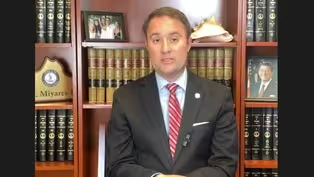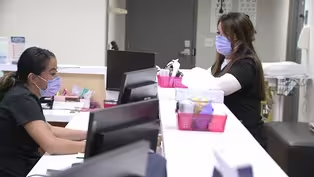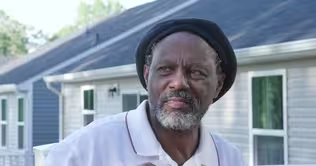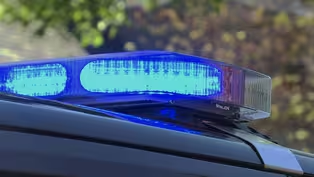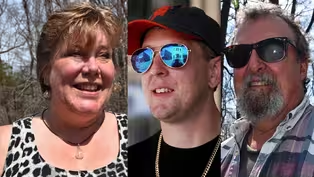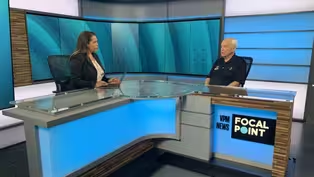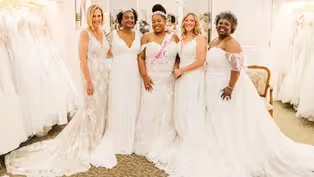VPM News Focal Point
Human Trafficking survivors fight back
Clip: Season 2 Episode 9 | 7m 58sVideo has Closed Captions
Two courageous survivors share their stories of being trafficked for sex as teenagers.
Two survivors share their stories of being trafficked for sex as teenagers. Today, they both serve on Governor Youngkin’s Commission on Human Trafficking Prevention and Survivor Support. Pamela Lynn Hock counsels survivors, offenders, and educates young people, while Tanya Gould is Director of the Anti-Human Trafficking Office of the Virginia Attorney General.
Problems playing video? | Closed Captioning Feedback
Problems playing video? | Closed Captioning Feedback
VPM News Focal Point is a local public television program presented by VPM
The Estate of Mrs. Ann Lee Saunders Brown
VPM News Focal Point
Human Trafficking survivors fight back
Clip: Season 2 Episode 9 | 7m 58sVideo has Closed Captions
Two survivors share their stories of being trafficked for sex as teenagers. Today, they both serve on Governor Youngkin’s Commission on Human Trafficking Prevention and Survivor Support. Pamela Lynn Hock counsels survivors, offenders, and educates young people, while Tanya Gould is Director of the Anti-Human Trafficking Office of the Virginia Attorney General.
Problems playing video? | Closed Captioning Feedback
How to Watch VPM News Focal Point
VPM News Focal Point is available to stream on pbs.org and the free PBS App, available on iPhone, Apple TV, Android TV, Android smartphones, Amazon Fire TV, Amazon Fire Tablet, Roku, Samsung Smart TV, and Vizio.
Providing Support for PBS.org
Learn Moreabout PBS online sponsorshipPAMELA LYNN HOCK: No matter how large or how small this city is, we need to focus on the idea that sex trafficking, victimization of humans knows no poverty line.
It knows no bounds in terms of status.
It doesn't care.
You know, we live in this cute little state of Virginia, and people ask how it compares, you know?
"Well, it's not as bad as New York.
It's not as bad as San Diego."
It's bad enough for me, and one case of sex trafficking should be enough for people to care.
PAMELA LYNN HOCK: You see, I'm a survivor of sex trafficking from the age of 13 to almost my 18th birthday.
PAMELA LYNN HOCK: I had this one friend that I would spend a lot of time with, and unfortunately this friend came from a very abusive household and they had a much older brother who was involved in drugs and gun violence.
And the day came where we were victimized by her brother and his friends.
They began to continually abuse us and then give us to, when I say give us, it's under threat and coercion, like, "You need to go with this friend or this person and do these things for them because we're telling you to."
PAMELA LYNN HOCK: I was taken from my home and my family, and I was forced to do things that no one should ever have to do.
PAMELA LYNN HOCK: One of the questions that I get is, "Why didn't you leave?"
We were children, and we did not have the developmental processes to let alone process the trauma that happened to us and then have the wherewithal to feel like we would be safe enough to tell someone.
And so we believed everything that they told us.
When they said, "We are going to murder you if you don't do what we tell you to do," we believed them.
ZANE GRAY: I think one, they're afraid because most of the time, they work under a master and they pretty much have them in their control.
So they're very, very fearful of what the repercussions to them could be.
PAMELA LYNN HOCK: So there was a girl that I once knew, and her name was Allison.
The last time I saw Allison, we were locked in a closet together in a hotel room outside Charlottesville.
I remember the closet door opened and one of our traffickers grabbed her arm and she wouldn't let go of me and she was just screaming, and they ripped her off of me.
And the closet door closed and I heard a few thuds and then I heard a gunshot.
And that was the last time that I ever saw Allison.
See, if you didn't comply with the rules, then you were not worth anything to them to keep you alive.
And so they just decided that your life was worth taking.
I think that the average American believes that trafficking victims/survivors are people who are standing on the corner.
JUSTIN COWAN: Unfortunately, the crime of human trafficking can happen anywhere.
It can happen in the homes that are in the very corner of Western Virginia.
It can happen in the Richmond metro area, Hampton Roads, Northern Virginia.
With the nature of communication today and the internet being what it is, this can really happen anywhere.
There's no one agency that is uniquely equipped to tackle the human trafficking issue alone, so we come together, we play to each other's strengths and fill the gap on weaknesses in order to best serve the victims of this crime.
PAMELA LYNN HOCK: I got my first degree in EMS, in paramedic studies, and then I got a criminal justice degree.
Then I went to school for a psychology and I got my bachelor's degree, and then I got my master's degree in forensic psychology.
A part of my advocacy and educational work is going to universities to speak about trafficking.
And I get calls all the time from universities to go talk to those students.
And my most recent project was to be on the Human Trafficking Prevention and Survivor Support Commission for the State of Virginia.
The purpose of the commission was to come together and address three main points: education, survivor support, and law enforcement side of how can we come together and support survivors, create laws, and educate the community about trafficking.
I was excited about the opportunity to have my voice as a survivor and, you know, the other survivors who were with us.
TANYA GOULD: I actually went to Chesterfield County Jail and did a talk with another survivor.
My name is Tanya Gould, and I'm director of Anti-Human Trafficking for the Office of the Attorney General.
Now, one girl, she did have a prostitution charge.
So the commission had survivors that were also a part of the commission in order to really give us good insight as to what survivors need.
And that's how you walk away with real, tangible, long lasting, beneficial reach into vulnerable populations, specifically.
When you think about it, survivors, you know, being a survivor myself, you know, we understand the thought that society sees us as criminals.
And so to be able to bring that mindset to the table to say, "Well, we're not criminals, we're actually victims," and the process from understanding what it means to go from victim to survivorship, that's important for people who are leaders in a movement, who are creating legislation, and who are doing programs, it's important for them them to understand that journey and that process.
They just know that what they did was wrong because they did it.
I didn't have love and support and validation growing up as a child.
It was all about surviving and trying to figure things out and, you know, doing a lot of things on my own.
So when someone comes into your life and realizes you didn't get those things, that's where they can, you know, play on you to do things their way.
Three of them disclosed that they were trafficked as teenagers.
I remember one time when I was with my trafficker and we were recruiting, and I saw a really pretty girl.
And, you know, I'm like, 'Oh my goodness, she's so beautiful.
What about her?'
And he says, "Uh, no, that wouldn't work.
Look how confidently she's walking.
Look at her, walking with her head up and her back straight."
And at the time I didn't get it, but I understand now the beauty that I saw was confidence.
And it was worth, and it was value.
She knew who she was.
I didn't know who I was, right?
And so that's what my trafficker took advantage of.
Knowing my worth and my value and, you know, all of those things, that is a deterrence when we're talking about prevention, human trafficking prevention.
PAMELA LYNN HOCK: I'm going to do what I have to do to survive and to continue to tell my story.
The public has a responsibility to know and understand what they're seeing around them, what is happening within their community, so that they can support survivors, they can support victims, they can take action.
They can also know when legislation is being passed and bills come up, what they need to support.
So education is important so that we can change society's mind about what trafficking looks like to them.
Attorney General Jason Miyares is fighting human trafficking
Video has Closed Captions
Clip: S2 Ep9 | 11m 19s | Attorney General Jason Miyares discusses efforts to end the crime of human trafficking (11m 19s)
From unaccompanied minor to physician assistant
Video has Closed Captions
Clip: S2 Ep9 | 2m 59s | This woman uses her Spanish-speaking skills to empower her patients (2m 59s)
Joseph Carter knows the price of a wrongful conviction
Video has Closed Captions
Clip: S2 Ep9 | 5m 7s | After almost three decades in prison, the Navy veteran is now piecing together his life. (5m 7s)
Psychological aftermath of mass shootings
Video has Closed Captions
Clip: S2 Ep9 | 1m 41s | How do survivors deal with the psychological aftermath of mass shootings? (1m 41s)
Survivors | People of Virginia
Video has Closed Captions
Clip: S2 Ep9 | 57s | How can people be better equipped to handle life’s most challenging situations? (57s)
Vietnam POW shares the lessons he learned from captivity
Video has Closed Captions
Clip: S2 Ep9 | 9m 45s | A Vietnam POW survived over 6 years in captivity. He shares the lessons he learned. (9m 45s)
Women find connection through cancer
Video has Closed Captions
Clip: S2 Ep9 | 3m 15s | Bonded by a cancer, these women found much more than friendship. (3m 15s)
Providing Support for PBS.org
Learn Moreabout PBS online sponsorship
- News and Public Affairs

Top journalists deliver compelling original analysis of the hour's headlines.

- News and Public Affairs

FRONTLINE is investigative journalism that questions, explains and changes our world.












Support for PBS provided by:
VPM News Focal Point is a local public television program presented by VPM
The Estate of Mrs. Ann Lee Saunders Brown
